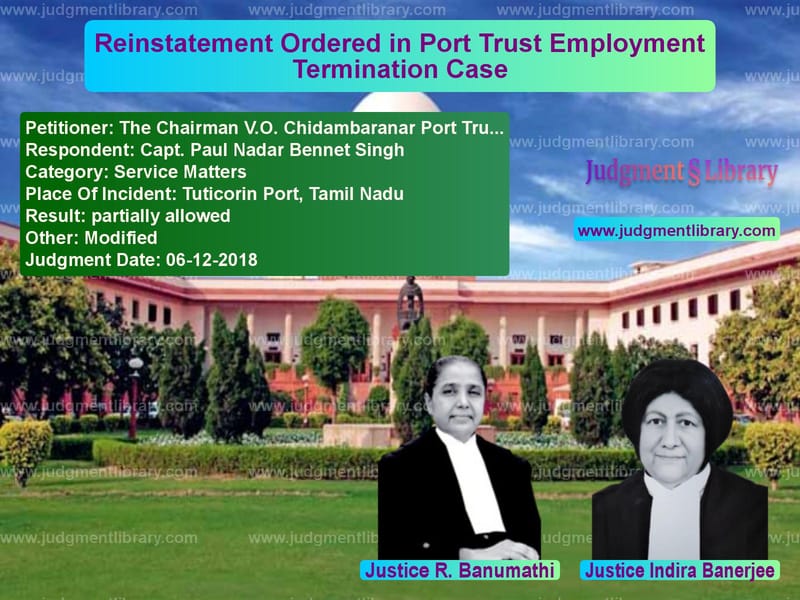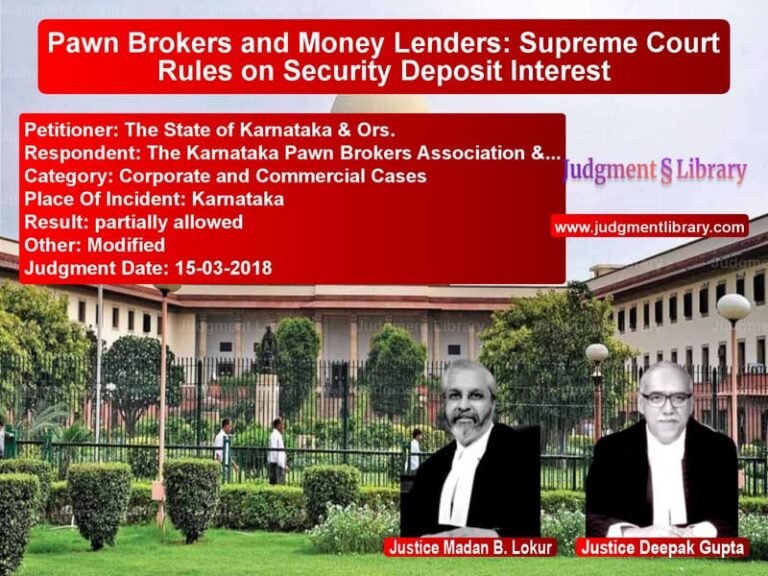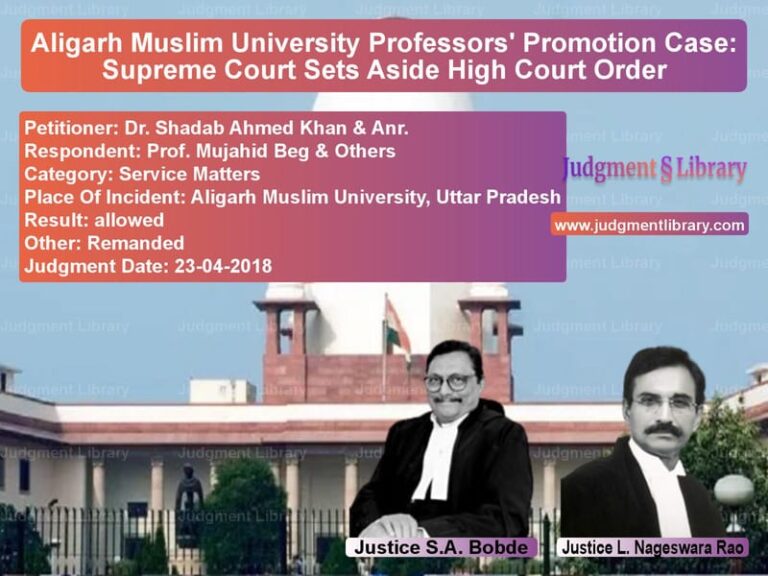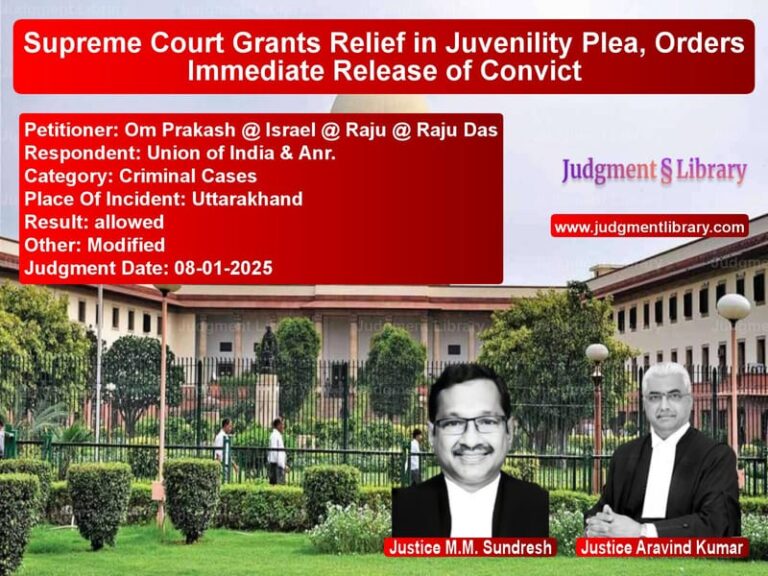Reinstatement Ordered in Port Trust Employment Termination Case
The case of The Chairman V.O. Chidambaranar Port Trust & Ors. v. Capt. Paul Nadar Bennet Singh revolved around the wrongful termination of the respondent from his position as a Pilot Officer at the Tuticorin Port Trust. The Supreme Court upheld the Madras High Court’s decision to reinstate the respondent with back wages, modifying the order to limit back wages to 40%.
Background of the Case
The dispute began when the respondent, Capt. Paul Nadar Bennet Singh, was terminated from his post by the Port Trust under the Tuticorin Port Employees (Temporary Service) Regulations, 1979. The respondent challenged this termination before the Madras High Court, which ruled in his favor, leading to an appeal by the Port Trust to the Supreme Court.
Facts of the Case
The respondent was appointed as a Pilot Officer in 2008 after successfully clearing the recruitment process. His appointment letter stated:
“Capt. Paul Nadar Bennet Singh is offered an appointment as Pilot on regular basis in the Tuticorin Port Trust in the scale of Pay of Rs. 1450-350-18700. He will be eligible for the usual allowances as admissible under the rules and orders in force from time to time.”
However, in 2012, the respondent’s service was terminated citing concerns about his Certificate of Competency (CoC), which had been issued by the Maritime and Port Authority of Singapore. The Port Trust argued that this certification was not equivalent to the certification issued by the Indian Government and, therefore, the respondent was ineligible for the post.
Arguments by the Petitioner (Port Trust)
The Port Trust contended that:
- The Certificate of Competency (CoC) issued by the Singapore authority was not recognized by the Government of India before May 27, 2014.
- The appointment of the respondent was void as he did not possess the required qualification.
- The termination was justified under Regulation 5(1)(a)(b) of the Tuticorin Port Employees (Temporary Service) Regulations, 1979.
- The High Court erred in reinstating the respondent when the legality of his certificate was in question.
Arguments by the Respondent
The respondent countered that:
- The advertisement for the Pilot Officer position did not specify that the CoC must be issued by an Indian authority.
- The Port Trust had sought clarification from the Ministry of Shipping, which confirmed that the certificate’s validity was subject to Port Regulations.
- The Port Trust had earlier accepted his certificate and allowed him to work for several years without objection.
- His performance as a Pilot Officer was satisfactory, and his dismissal was arbitrary.
Supreme Court’s Observations
The Supreme Court analyzed the regulatory framework governing pilotage and employment in the Port Trust and noted the following key points:
- As per Tuticorin Port (Authorization of Pilots) Regulations, 1979, a pilot must possess a Certificate of Competency as Master (Foreign-going) granted by the Government of India or its equivalent.
- The Port Trust did not initially object to the respondent’s CoC issued by Singapore.
- The respondent had successfully cleared the examination for a pilot license in 2009, fulfilling the employment criteria.
- The Port Trust had sought confirmation from the Ministry of Shipping, which had left the decision to the Port Trust’s discretion.
- The Port Trust had acknowledged the respondent’s skills and experience in a letter dated September 29, 2008.
Based on these observations, the Court concluded that the Port Trust had wrongfully terminated the respondent and upheld the High Court’s order for reinstatement.
Supreme Court’s Judgment
The Supreme Court ruled that:
- The respondent’s termination was arbitrary and unjustified.
- The Port Trust failed to demonstrate that the Singapore CoC was invalid for pilotage duties in Indian ports.
- The respondent should be reinstated with back wages.
- However, due to the long period of unemployment, the back wages were limited to 40% from 2012 to the date of reinstatement.
The Court emphasized:
“Neither at the time of the appointment nor subsequently did the appellants raise any objection that the Certificate of Competency granted by the Maritime and Port Authority of Singapore was not equivalent to the CoC granted by the Government of India.”
Impact of the Judgment
This ruling is a crucial precedent in employment law and public sector service regulations. It underscores:
- Importance of transparency in recruitment and termination procedures.
- Accountability of public sector employers in adhering to fair labor practices.
- Recognition of equivalent qualifications in globalized employment sectors.
Conclusion
The Supreme Court’s decision in The Chairman V.O. Chidambaranar Port Trust & Ors. v. Capt. Paul Nadar Bennet Singh serves as an important ruling on employment termination and qualification recognition. The Court upheld the principle that an employer cannot retroactively question an employee’s qualifications after appointing and allowing them to work for years. This judgment reinforces the necessity for procedural fairness and accountability in employment decisions, particularly in government and public sector jobs.
Petitioner Name: The Chairman V.O. Chidambaranar Port Trust & Ors..Respondent Name: Capt. Paul Nadar Bennet Singh.Judgment By: Justice R. Banumathi, Justice Indira Banerjee.Place Of Incident: Tuticorin Port, Tamil Nadu.Judgment Date: 06-12-2018.
Don’t miss out on the full details! Download the complete judgment in PDF format below and gain valuable insights instantly!
Download Judgment: The Chairman V.O. Ch vs Capt. Paul Nadar Ben Supreme Court of India Judgment Dated 06-12-2018.pdf
Direct Downlaod Judgment: Direct downlaod this Judgment
See all petitions in Employment Disputes
See all petitions in Termination Cases
See all petitions in Recruitment Policies
See all petitions in Judgment by R. Banumathi
See all petitions in Judgment by Indira Banerjee
See all petitions in partially allowed
See all petitions in Modified
See all petitions in supreme court of India judgments December 2018
See all petitions in 2018 judgments
See all posts in Service Matters Category
See all allowed petitions in Service Matters Category
See all Dismissed petitions in Service Matters Category
See all partially allowed petitions in Service Matters Category







